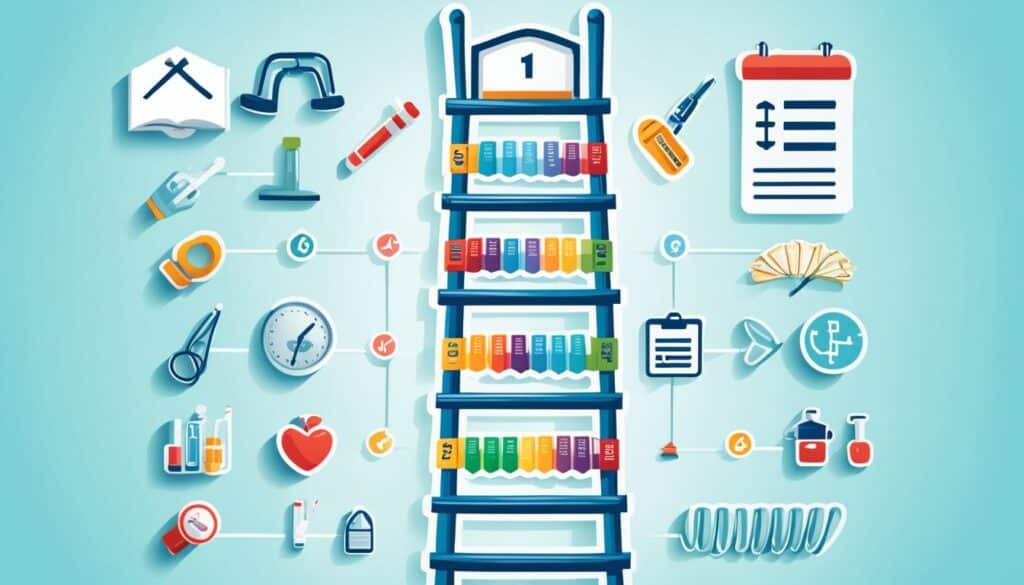Nursing education spans from the basic certified nursing assistants (CNAs) to the highest level which is advanced practice registered nurses (APRNs) with doctoral degrees. It is vital for those wanting to enter the field to know the options. This helps them pick a path that meets their goals and interests.
Key Takeaways
- Nursing education offers a diverse range of programs, from entry-level certifications to advanced practice degrees.
- The licensed practical nurse (LPN) and registered nurse (RN) are two of the most common and widely recognized nursing roles.
- Bachelor of Science in Nursing (BSN) and Master of Science in Nursing (MSN) degrees provide opportunities for career advancement and specialized practice.
- Advanced Practice Registered Nurses (APRNs), such as nurse practitioners, clinical nurse specialists, and nurse anesthetists, represent the highest level of nursing education and practice.
- It’s crucial for aspiring nurses to understand the scope of practice and the educational journey at each level. This knowledge helps them make smart career choices.
Introduction to Nursing Education
Nursing is a big field with lots of career paths. You can work directly with patients or lead in nursing. It’s important to know your options to pick what fits your goals best.
Understanding the Nursing Profession
Nurses are key in healthcare, providing care and leading teams. They work in many places, like hospitals and schools. Each place needs different skills and knowledge.
Importance of Nursing Education
Getting a good education is vital for nurses. It mixes theory with practice, preparing them to give the best care. Learning never stops, with chances to grow throughout a nursing career.
Overview of Different Levels
Nursing education has many levels, from basics to advanced degrees. You can start as a CNA or aim to be an APRN. Each role has its own duty and place in healthcare, so it’s key to know what each level involves for picking your path.
Certified Nursing Assistant (CNA)

Certified Nursing Assistants (CNAs) are key in healthcare, also known as nursing aides or assistants. They provide essential care under nurses’ supervision. CNAs are vital because they are often the first point of contact for patients and their families.
Role and Responsibilities
CNAs help patients with daily living tasks like bathing, dressing, and moving around. They check patients’ vital signs and let nurses know if they see any changes. They are the ones who keep the patient areas safe and clean. CNAs team up with Registered Nurses (RNs) and Licensed Practical Nurses (LPNs) to ensure patients are well.
Educational Requirements
To be a Certified Nursing Assistant, you need to finish a state-approved training program. These programs last 4-12 weeks and cover communication, patient care, and other skills. After the training, you have to pass an exam to get your CNA certification.
Job Outlook and Salary
The need for CNAs will keep growing as more people need health services, especially those from the aging population. The U.S. Bureau of Labor Statistics says CNA jobs will increase by 8% from 2019 to 2029, faster than average. They earn around $30,000 a year to start, but as they get more experience and certifications, they can make more and find new opportunities.
Licensed Practical Nurse (LPN)

Licensed Practical Nurses (LPNs) or Licensed Vocational Nurses (LVNs) are essential in the healthcare team. They provide important nursing care under the supervision of registered nurses (RNs) or doctors. They often serve as the main link between patients, their families, and the healthcare team. This helps to make patient care organized and personal.
Duties and Scope of Practice
LPNs have a lot of nursing tasks, such as checking vital signs and giving medications. They help with simple wound care and daily activities. LPNs’ work focuses on tasks that don’t need as much clinical knowledge or making decisions alone.
LPN Education Programs
LPN programs are usually found in vocational schools or community colleges. They last about 12 to 18 months. Students learn in classrooms and real healthcare settings. This prepares them to care for patients in various places.
Licensure and Certification
After their LPN program, students take the NCLEX-PN to get their license. Some states might need extra certifications. LPNs also have to continue learning to keep their license.
| Key Responsibilities of LPNs | Common LPN Education Programs | LPN Licensure and Certification |
|---|---|---|
|
|
|
Registered Nurse (RN)

Registered Nurses (RNs) are key players in patient care. They work in different healthcare places. RNs work closely with doctors and other healthcare workers to give top-notch care that focuses on the patient.
Associate Degree in Nursing (ADN)
The Associate Degree in Nursing (ADN) takes two years to complete. It gets students ready to start their careers as RNs. This program teaches them important nursing theories and gives hands-on patient care experience.
After finishing their ADN, students can take the NCLEX-RN exam. Passing this exam means they can get their RN license. This license lets them work as a nurse.
Bachelor of Science in Nursing (BSN)
The Bachelor of Science in Nursing (BSN) takes four years to finish. It offers a deeper understanding of nursing. With more study in research and leadership, BSN graduates are prepared for various nursing jobs.
NCLEX-RN Exam
To become an RN, everyone must pass the NCLEX-RN exam. This exam checks if they have the right skills and knowledge to work safely with patients. It’s a big step toward becoming a registered nurse.
Nursing Education

Nursing education offers many paths for different roles in healthcare. You can start with the basic Certified Nursing Assistant (CNA) or Licensed Practical Nurse (LPN) program. These teach the skills needed for patient care. You might then move on to the Associate Degree in Nursing (ADN) or the Bachelor of Science in Nursing (BSN). They help you become a Registered Nurse (RN).
For those aiming higher, there are the Master of Science in Nursing (MSN) and the Doctor of Nursing Practice (DNP). These degrees lead to leadership and specialized roles. You can also become an Advanced Practice Registered Nurse (APRN). This might mean becoming a Nurse Practitioner (NP), Certified Nurse-Midwife (CNM), Clinical Nurse Specialist (CNS), or a Certified Registered Nurse Anesthetist (CRNA). Such roles are key in healthcare as they can work independently and even lead teams.
With the various options in nursing education, everyone can find a path that fits their goals. Whether you’re looking at the basic roles or something more specialized, nursing has a place for you. This field is full of chances to grow and have a big impact on health.
Advanced Practice Registered Nurse (APRN)

At the top of the nursing ladder are Advanced Practice Registered Nurses (APRNs). They have a deep level of knowledge, skills, and the ability to work independently. This goes beyond what entry-level and generalist nurses can do. APRNs are key in the U.S. healthcare, often leading and providing primary care or specialty services.
Nurse Practitioner (NP)
Nurse Practitioners (NPs) are a type of APRN with advanced training in clinical care. They can diagnose and treat many health issues. The unique thing about NPs is that they work hand in hand with doctors, providing care focused on the whole patient.
Certified Nurse-Midwife (CNM)
Certified Nurse-Midwives (CNMs) focus on providing complete care to women. This care spans from pregnancy to after birth. They work in various places such as hospitals and birthing centers, offering support and expertise during this special time in a woman’s life.
Clinical Nurse Specialist (CNS)
Clinical Nurse Specialists (CNSs) concentrate on a specific patient group, health area, or care setting. Their advanced knowledge benefits both patients and other nurses. They are key in making healthcare better through the use of new evidence and best practices.
Certified Registered Nurse Anesthetist (CRNA)
When it comes to providing anesthesia for surgery and other procedures, Certified Registered Nurse Anesthetists (CRNAs) are in charge. They work together with the surgery team to make sure patients are safe and comfortable during their procedures.
Also Read: The Top 10 Universities Worldwide Offering Scholarship
Master of Science in Nursing (MSN)
The MSN degree is a step up from your first nursing degree. It gets you ready for more complex nursing jobs and leading in healthcare. This program teaches you a lot, like how to think critically and work in different nursing areas.
Program Curriculum
Your MSN studies will mix main nursing courses, advanced ones, and some you pick based on your job goals. You’ll learn about tough topics like the causes of diseases, drugs, and how healthcare policies are formed. You’ll also dive into nursing research and tips for leading in health settings. Hands-on practice is a big part, too. It lets you use what you’re learning in real healthcare spots.
Specializations
With an MSN, you can become a nurse pro in a specific area. You could go for being a Nurse Practitioner, Clinical Nurse Specialist, Nurse-Midwife, or Nurse Anesthetist. Each area helps you focus your care on certain patients or needs, boosting your career chances.
Having an MSN opens the door to lots of important jobs in nursing. You could be a top caregiver, manage a nursing team, or teach the next generation of nurses. With all the extra skills and knowledge, MSN nurses make big changes in healthcare and help patients and communities thrive.
FAQs
What are the different levels of nursing education available?
There are many levels of nursing education. It starts with certified nursing assistants (CNAs) and goes up to advanced practice registered nurses (APRNs). In between, there are LPNs, RNs with different degrees, and APRNs. Each level has different roles and responsibilities.
What is the role and responsibility of a certified nursing assistant (CNA)?
Certified Nursing Assistants (CNAs) are the first step in nursing. They help patients with basic care under nurse supervision. They’re often the link between patients, their families, and the healthcare team.
What is the scope of practice for a licensed practical nurse (LPN)?
Licensed Practical Nurses (LPNs) provide more care than CNAs but under the guidance of RNs or doctors. They’re key in sharing information between patients and the healthcare team.
What are the educational paths to become a registered nurse (RN)?
Registered Nurses (RNs) have the most recognizable roles. They can start with an associate or a bachelor’s degree in nursing. After school, they have to pass the NCLEX-RN exam to get their license.
What are the different advanced practice registered nurse (APRN) roles?
APRNs are the top level of nursing practice. This group includes nurse practitioners, midwives, clinical specialists, and nurse anesthetists. They have advanced skills and knowledge.
What is the purpose of a Master of Science in Nursing (MSN) degree?
An MSN degree is for nurses who want to go further in their careers. It prepares them for advanced roles and leadership. Nurses can choose from many specialties like educator or administrator.
Source Links
- https://online.xavier.edu/understanding-the-different-levels-of-nursing-education-roles-and-specializations/
- https://www.rasmussen.edu/degrees/nursing/blog/different-levels-of-nursing/
- https://www.usa.edu/blog/levels-of-nursing-explained/




